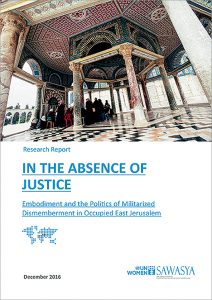By Dr. Nadera Shalhoub-Kevorkian
Available at http://palestine.unwomen.org/en/news-and-events/stories/2016/12/absence-of-justice-research
……………………………………………………
Reviewed by Dr. Ana Lukatela
 This research study examines the socio-political factors that affect Palestinian women’s access to justice in East Jerusalem. Occupied by Israel in 1967, East Jerusalem exists in a liminal space where intersecting legal systems contribute to a complex machinery of bureaucracy, law, and justice systems. The aim of this study is to deepen understanding of Palestinian women’s experiences in Jerusalem as they attempt to access justice through both formal institutions and informal paths. The research collected data prior to, during, and after the beginning of the escalation of violence in Jerusalem in October 2015. The data was compared and analyzed not only to map the banality of violence women face and the way it affects women’s access to justice, but also to learn women’s “countermaps” – the everyday strategies that Palestinian women living in Jerusalem employ to survive and resist violence, and navigate power structures in their attempts to access justice.
This research study examines the socio-political factors that affect Palestinian women’s access to justice in East Jerusalem. Occupied by Israel in 1967, East Jerusalem exists in a liminal space where intersecting legal systems contribute to a complex machinery of bureaucracy, law, and justice systems. The aim of this study is to deepen understanding of Palestinian women’s experiences in Jerusalem as they attempt to access justice through both formal institutions and informal paths. The research collected data prior to, during, and after the beginning of the escalation of violence in Jerusalem in October 2015. The data was compared and analyzed not only to map the banality of violence women face and the way it affects women’s access to justice, but also to learn women’s “countermaps” – the everyday strategies that Palestinian women living in Jerusalem employ to survive and resist violence, and navigate power structures in their attempts to access justice.
The firsthand accounts of East Jerusalemite women in this research study give critical voice to the challenges Palestinian women are facing after more than 50 years of occupation. Occupation and patriarchy work together to create significant obstacles for East Jerusalemite women in realizing their social, legal, political, and economic rights as well as physical safety. The Israeli ID card system holds women hostage in a bureaucratic trap where they cannot access justice without the “right” ID card or are constantly in fear of their family members being deported from Jerusalem. Women are stigmatized by their communities if they report gender-based violence to Israeli authorities. Women don’t report workplace abuse and harassment for fear of ridicule, eviction, and/or residency revocation. Women who live behind the wall in East Jerusalem have limited access to services or justice even though they are East Jerusalem residents. Women and girls feel that the most intimate aspects of their lives are constantly under surveillance and describe living with the constant pressure of racism and discrimination.
The gendered price of surviving such a system of dispossession and entrapment is high, as militarized violence invades the most intimate spheres of women’s lives – their family life, homes, bodies, and psyches. These women, the study found, have little faith in the Israeli justice system, no protection from the Palestinian Authority, and experience the consequences of the willful failure by the State of Israel in its obligations under international law and accountability. In this atmosphere, women turn to alternative measures to access justice, working to “re-member” what is dismembered.

